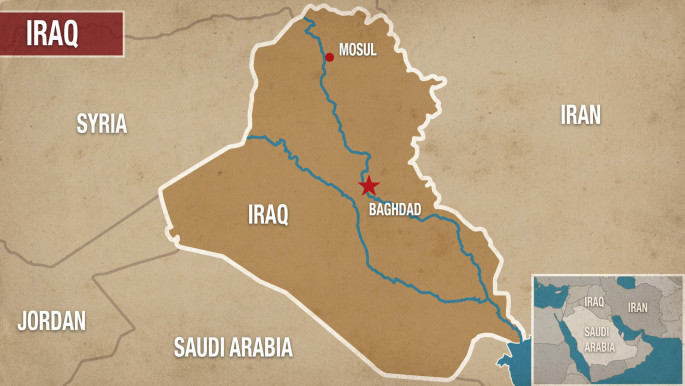As Mosul operations begin, humanitarian concerns escalate
As military operations begin in Mosul, humanitarian groups are increasingly concerned about the fate of civilians trapped in the Islamic State-controlled Iraqi city.
These groups include Save the Children which has noted that families in Mosul have become stuck between a rock and a hard place, scared to remain, but also terrified to leave.
"Some people have managed to flee in the past couple of weeks," Alun McDonald, Middle East region media manager at Save the Children tells The New Arab.
"They say many people in the city want to flee but can’t. They are worried about getting caught in the cross-fire, standing on mines or booby trapped explosives, or getting caught by IS trying to leave. Meanwhile food prices in the city are high and many people can’t afford to eat."
 |
Many people in the city want to flee but can’t. They are worried about getting caught in the cross-fire, standing on mines or booby trapped explosives, or getting caught by IS trying to leave. Meanwhile food prices in the city are high and many people can’t afford to eat |  |
 |
|
Looming humanitarian disaster
While a total of 16 different countries – including the US, UK, Iran, Australia, Canada, and France – are said to be taking part in the Mosul offensive, earlier this month the UN’s Office for the Coordination of Humanitarian Assistance (OCHA) announced that the UN’s aid appeal of $861 million for Mosul currently stands less than 40 percent funded.
Worryingly, OCHA’s UN envoy Jan Kubis, has warned that humanitarian efforts could cost "as much as $1 billion" noting that with more than one million people estimated to be trapped inside Mosul military operations, it could trigger the “largest humanitarian crisis in the world” in 2016.
 |
Humanitarian efforts could cost as much as $1 billion and with more than one million people estimated to be trapped inside Mosul military operations it could trigger the largest humanitarian crisis in the world in 2016 |  |
Due in part to aid shortfalls, as of October 16, space in emergency accommodation in seven camps set up for those displaced from Mosul can only accommodate 60,000 people, with additional accommodation for 250,000 people currently under construction.
Aid groups have expressed concern that amid the military focus on defeating IS in the group’s Iraqi headquarters, there has been a lack of consideration for the humanitarian fallout.
"There has been a lack of planning; either there will be a lot of civilian casualties or a lot of people fleeing," said McDonald. "The humanitarian aspect has been like an afterthought."
 |
There has been a lack of planning; either there will be a lot of civilian casualties or a lot of people fleeing... The humanitarian aspect has been like an afterthought |  |
Humanitarian fallout overlooked
Iraqi military commanders are said to have asked civilians in Mosul to remain inside and display white flags on their houses. But this measure has been deemed grossly insufficient with Save the Children pointing out that this could lead IS fighters to turn civilian buildings into military positions and use civilians as human shields.
Shortly before the launch of the Mosul offensive was announced by Iraqi Prime Minister Haider al-Abadi on Sunday night, thousands managed to flee the city.
According to Save the Children, more than 1,000 have reached areas surrounding the city of Hawija in Kirkuk province, around 180 km south east of Mosul; while 5,000 are said to have fled to northern Syria where they are being accommodated in the al-Houl camp in Hassakeh province.
McDonald explained that some people had arrived to these camps badly malnourished having sometimes walked for more than 100km.
"There are some children that have arrived with diarrhoea, others that are exhausted," said McDonald explaining that Save the Children was providing emergency water supplies, dried food, soap and other items to newly displaced families.
“The main problem at the camps will not be access to food but the risk of overcrowding.”
 |
There are some children that have arrived with diarrhoea, others that are exhausted |  |
Establishing safe routes
Save the Children has called for the establishment of "safe routes" out of Mosul to enable civilians to flee the fighting.
McDonald noted that a failure to do so during the Iraqi army’s recapture of Fallujah in July – when civilians were also asked to display white flags outside their residences – lead to avoidable civilian casualties during a campaign in which Shia militias are also said to have killed as many as 300 civilians in misplaced acts of retribution against IS.
Fears of a repeat of such events resulted in calls by international actors, including the UK, to keep the Shia militia Hashd al-Shaabi, or Popular Mobilization Units, away from the frontlines in Mosul.
Speaking earlier this month Lama Faikh, deputy director of Human Rights Watch’s Middle East programme noted that “civilians in Mosul have suffered under IS rule for more than two years and will need support if the city is retaken, but risk reprisals instead.
“The last thing the authorities should allow is for abusive forces to carry out revenge attacks in an atmosphere of impunity,” said Fakih.
However, McDonald admitted that he remained unsure of how exactly safe routes out of Mosul could be established, particularly during the early weeks of the offensive when the Iraqi army was still battling to make inroads into the city.
"It is an incredibly difficult situation," said McDonald. "We are not military experts but we know that white flags will not enough."







